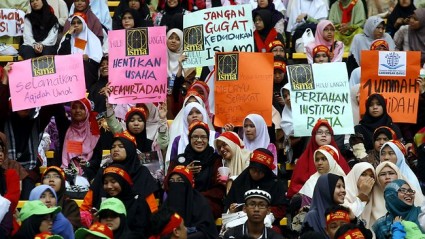Islamic-related issues have always figured prominently in Malaysian politics, especially so since the late 1970s when the wave of Islamisation hit its shores. This upcoming general election will be no different though the impact and effectiveness of instrumentalising these issues still remain to be seen. The main Islamic-related issues that are currently at the center of electoral discourse are: “Hudud”, the “Allah” controversy, and “Islamic Unity.”
Hudud
Hudud is essentially Islamic criminal law and its implementation has long been part of the Islamic opposition party PAS’s political agenda. Only in the past five years, ever since joining the opposition coalition Pakatan Rakyat (PR), the issue of hudud implementation has been relegated to the backburner as the focus shifts to issues such as good governance, anti-corruption, social justice, and bread-and-butter matters. This is namely due to the rising influence of the professional faction within PAS and its need to find a common platform with the other component parties of the coalition.
Still, the hudud issue does crop up on occasions, as recently as last week, when the deputy spiritual leader of PAS who is also a Parliamentary candidate, Dr. Haron Din, stated that PAS will implement hudud if PR takes over the government by amending the constitution, even over the strenuous objection from its secular coalition partner, DAP. This declaration, along with the almost similar one made by PAS’s secretary general, Mustafa Ali, was predictably exploited by the ruling coalition and its controlled media to scare up the non-Muslim voters into not supporting the PR. There were ads in the mainstream media that claimed a vote for DAP is a vote for PAS, which translates to a vote for hudud. The effectiveness of using hudud issue to drive a wedge within the non-Muslim voters, especially the Chinese, remains to be seen.
Allah
This is an issue that concerns the use of the word “Allah” in the Malay-language bibles. It has somewhat dropped off the radar for a while but is now making a comeback as the election draws closer. Most recently, billboards were put up exploiting this issue, despite the protestation of mainstream Christian groups. The saliency of using the “Allah” issue still remains unclear but it somehow resonates more in Sabah and Sarawak since the indigenous tribes have been using the Malay-language bibles in church services for decades and it might potentially affect the voting pattern in those two states. It is hard to say the kind of impact the issue will have on the Malay-Muslim community because, as with hudud, the playing-up of this issue seems to be targeted toward certain demographic, namely the rural Malay folks, since the urban Malays are generally more concerned with socio-economic matters.
Islamic Unity
There are still factions within PAS and PKR (the other component party of PR) that advocate for “Islamic unity” (read: Malay unity since in Malaysia, constitutionally-speaking, there is no difference between being a Malay and a Muslim). The main reason being the Malay-Muslim community is riven by partisan politics and that all Muslims should instead make struggling for Islam their number one political goal. In addition, according to the proponents of “Islamic unity,” a divided Malay-Muslim community leaves it vulnerable to exploitation by others who want to abolish the special status of Islam in Malaysia and make it on par with other religions. Banners have been seen urging Muslim voters to set aside their differences and vote for “Islamic unity,” which essentially means supporting the Malay dominance as represented by UMNO and its perceived collaborators inside PR. It is difficult to say how will this affects the way Muslims vote since it depends largely on the Muslim voters’ degree of comfort in regards to the partnership between PAS and DAP.
Exploiting the Islamic-related issues is also another way to inject the notion of Malay supremacy and the perceived threats from other ethnic groups into public discourse as racial politics is slowly losing its emotional appeal among the electorates since the political tsunami of 2008. By using this ploy UMNO hopes that Malays who have flocked to PAS will return to its fold in this coming elections, while its Chinese counterpart, MCA, also keeping its finger crossed that the Islamic issues, especially hudud, can help to peel away some voters from the Chinese community that overwhelmingly supports the PR. The outcome – we shall find out shortly.
Azmil Tayeb is a PhD candidate at the Department of Political and Social Change, College of Asia and the Pacific, Australian National University.
 Facebook
Facebook  Twitter
Twitter  Soundcloud
Soundcloud  Youtube
Youtube  Rss
Rss 